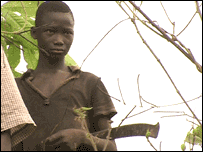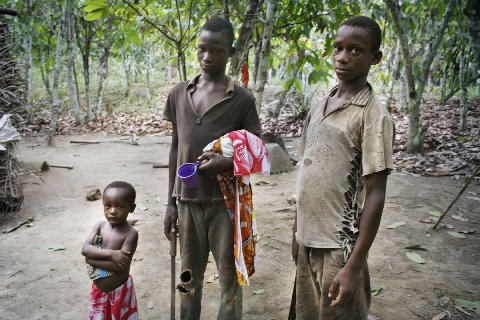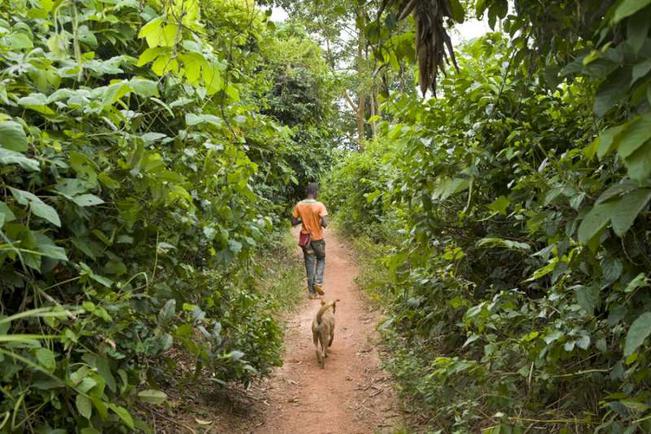5 to 6 million cocoa farmers world wide
40 to 50 million people depend on cocoa for their livleihood
Current global market value of annual crop: 5.1 billion dollars
Cocoa growing regions: Africa, Asia, Central America, South America (all within 20 degrees of the equator)
Percentage of cocoa that comes from West Africa: 70 percent
Welcome! Thanks for visiting Slave Free Chocolate. We are a grass roots organization with a simple mission. Child slaves are being used to work and harvest cocoa on the farms in West Africa. We thought this issue was resolved with the Harkin-Engel Protocol of 2001. This protocol signed by all of the major importers and manufactures of cocoa called for a vast reduction in the problem by 2005 and another milestone in 2008. Sadly, there is little evidence that anything has changed. Fourteen years has passed and although the Fair Trade movement has grown, it is not part of their charter to provide remediation and reinsertion for these children. Slave Free Chocolate is calling for a "Slave Free" labeling system on all chocolate bars, if there chocolate is ethically sourced.
Cargill announces new plan.
Côte d'Ivoire and West Africa
Although cocoa is grown in several areas throughout the world, West Africa produces nearly three-quarters of the world’s cocoa. Côte d'Ivoire is the largest producer, with over 800,000 small-scale farmers and representing over 40 percent of the world’s supply.
As a key processor of Ivorian cocoa, Cargill is financing and supporting activities that are helping small-scale farmers and communities increase their incomes from cocoa, improve farming practices, and access essential financial and logistical support.
Joint Statement from U.S. Senator Tom Harkin, Representative Eliot Engel and the Chocolate and Cocoa Industry on the Implementation of the Harkin-Engel Protocol
Protocol Drives Number of Achievements; Industry Outlines Next Steps
WASHINGTON, DC, USA (June 16, 2008) - In September 2001, industry representatives signed an agreement, today known as the “Harkin-Engel Protocol,” developed in partnership with U.S. Senator Tom Harkin (D-IA) and U.S. Representative Eliot Engel (D-NY). The agreement laid out a series of steps aimed at eliminating the worst forms of child labor and forced adult labor from cocoa growing in West Africa. An unprecedented effort, the Protocol marked the first time that an entire industry stepped forward and worked with governments, civil society and other stakeholders to address the worst forms of child labor and forced adult labor in its supply chain.
Cocoa Industry Fails to Deliver on July 1, 2008 Child Labor Commitments ILRF Releases New Analysis of Industry’s Failure to Eliminate Child Labor The chocolate industry has failed to provide consumers with a reasonable assurance that the chocolate they buy was made without exploited and trafficked child labor. Major chocolate companies signed what is referred to as the Harkin-Engel Protocol in 2001, promising to eliminate the worst forms of child labor from their supply chains, after media stories emerged depicting the widespread use of forced child labor and trafficking on West African cocoa farms. After failing to meet their July 1, 2005 commitments, the Protocol was weakened and extended to July 1, 2008. Once again, the industry has missed the deadline. Bama Athreya , Executive Director of the International Labor Rights Forum , said, “The major chocolate companies are not able to prove the elimination of exploited child labor in their cocoa supply, nor show concrete improvements in West African farmers’ lives. Consumers cannot be assured today that their favorite chocolate candies are made without abusive child labor.” In a new report issued today, titled “The Cocoa Protocol: Success or Failure,” the International Labor Rights Forum presented the following findings: • The original intent of the ‘protocol’ has not been achieved, and consumers today have no more assurance than they did eight years ago that trafficked or exploited child labor was not used in the production of their chocolate; • Industry is making false claims regarding certification; • Industry may be assigning itself too much credit for activities that may in any case have resulted from bilateral and multilateral government engagement; • ‘Verification’ has been rendered irrelevant by the fact that the process supported by industry no longer bears any relation to supply chain monitoring or certification; • Industry-supported programs have not been properly evaluated and therefore the actual impacts of such programs are unknown; • Industry has not adequately defined what it considers remediation; • Reports from West Africa point to the continued use of the worst forms of child labor as well as trafficking of children. The report presents the following recommendations*: • Companies should establish traceability within their own supply chain to the farm or cooperative level; • Companies should work through existing initiatives (for example, Fair Trade, Utz Certified and Rainforest Alliance) to develop stronger methodologies for labor standards monitoring and link these systems directly to the government processes with an incentive/sanction system; • Companies should ensure that their own operations and their supply chains adhere to internationally established codes of practice, including the ILO Tripartite Declaration for Multinational Enterprises and the OECD Guidelines for Multinational Corporations; • The US Government should cease to protect the interests of chocolate companies and instead invest in funding multilateral initiatives through the ILO-IPEC program and through funding for the Education for All initiative, and should support revenue transparency in the cocoa sector. Tim Newman of ILRF’s Campaigns Department stated, “Consumers should reward companies with ethical integrity in their supply chains and continue to demand that world’s largest chocolate companies answer the question of how consumers can be assured their chocolate is not produced using exploited child labor.”
Child Labor Commitments ILRF Releases New Analysis of Industry’s Failure to Eliminate Child Labor
Nestlé and the Cynical Use of Certification; “Fair Trade” for Some Tiny Percentage Gives Reputational Boost
By Jeff Ballinger
Do we debate Fairtrade (Ft) labeling and marketing in the U.S.? No, not so much – at least not compared to Britain, where it is something of a blood sport (some links below). It may be somewhat unfair to lump Ft in with Corporate Social Responsibility (CSR), but that’s the direction in which I’m presently leaning – especially since I started researching issues related to TransFair USA’s imminent launch of a pilot factory standard for clothes.
Nestlé strategy with Kit Kat – the largest-selling candy bar in the UK – is to spend less than a million dollars annually for a Ft premium to cocoa growers so that all KK’s sold in the UK + Ireland get the Ft logo. This amount is less than 2% of the advertising budget for Nescafe/UK and, indeed, should be viewed as part of that advertising spending.
Cocoa strategy, then, closely follows Nestlé behavior vis a vis sourcing ethical coffee (0.2% of total purchases). Why bother? There’s an opinion from Mike Brady, Campaigns and Networking Coordinator at Baby Milk Action here: “In evaluating Nestlé's motives, we shouldn't forget that the Chairman, Peter Brabeck-Letmathé, has said that Nestlé should only support charities if it will benefit his shareholders and the reasoning here [Kit Kat] will be the same.” Many other relevant views expressed here in 2007 BBC magazine story: How fair is Fairtrade?
For comments on a fine opinion piece in the Guardian 10 days ago, see Andrew Chambers’ “Not So Fair Trade.” Just yesterday, Prof. Daniel Jaffee (Washington State University) cleared up what he saw as a misrepresentation of his position – very interesting (& includes this insight: “If TNCs such as Nestlé and Dole are allowed to dabble in fair trade at token proportions of their overall volume - without being held to firm minimum percentage levels and being forced to raise those volumes steadily over time -fair trade runs the risk of serving to sanitize the image of corporations with poor human rights records, of becoming a “fair-washing” device...”)
DUÉKOUÉ, Côte d'Ivoire, November 27 (UNHCR) – When asked about his past, Ousmane* hesitates, clearly reluctant to talk about it. He has suffered a great deal in his life, and it pains him to recount bad memories.
Once he realizes that his UNHCR visitors are friends, he begins to open up and tell his harrowing tale of life without a nationality. His recollections of childhood are hazy – he knows only that he was born in a small village in south-east Côte d'Ivoire, across the border from Ghana, that his mother was a citizen of Burkina Faso, or Burkinabé, and that his father disappeared when he was young.
But when asked what nationality he has, Ousmane cannot answer. Like many other children born in rural areas of Côte d'Ivoire, the 33-year-old was not registered at birth. He was born out of wedlock, but his mother died shortly after his birth and Ousmane's father was never identified. He was raised in the Burkinabé community.
To make matters worse, he cannot produce any documents that confirm his parents' identity or prove his own nationality. Neither the Ivorian nor the Burkina Faso authorities recognize him as a national of their country. Like more than 10 million other people in the world, he is stateless.
But rather than accepting his legal limbo, Ousmane is trying to do something about it. And he has the support of UNHCR, which is lobbying the authorities to resolve his status, either through the recognition of Burkinabé citizenship or as a stateless person in Côte d'Ivoire entitled to rights, including the right to an ID.
UNHCR earlier this month launched a campaign to end statelessness by 2024, urging governments to change their laws and recognize stateless people. Without legal recognition, many stateless people lack access to basic rights, including travel, education and employment.
The government of Côte d'Ivoire in April launched a special programme to enable certain groups who have been living on Ivorian soil for generations to acquire nationality by declaration. This new temporary procedure is intended to resolve the problem of historical migrants who were legally entitled to acquire Ivorian nationality, but failed to do so in time.
Ousmane discovered how difficult life without a nationality could be, when he tried to escape a life of exploitation. In 1987, aged just six years, he was taken from his village by a woman who claimed to be an aunt and sold him to a landowner in Gbapleu, about 650 kilometres north-west of the Côte d'Ivoire capital Abidjan.
Over the next eight years, he was forced to work in the cocoa plantations of an abusive landowner. He had to clear brush, plant and pick cocoa beans and plough fields, and was severely beaten if he complained or was too slow. "They would hit me across the face, across the chest, over and over again," he says.
Being stateless made him more vulnerable; without legal status it was difficult for him to make a formal complaint. But one day, when he was about 14, Ousmane escaped and made his way to his birth village in search of relatives. Since he had no documents, he did what many stateless people desperate for some kind of legal identity do.
He obtained the consular card of a young Burkinabé man who had recently died and used it to cross the country and get past checkpoints. The card is issued by the Burkina Faso authorities to Burkinabés living in Côte d'Ivoire to confirm their citizenship. There was no sign of his elusive father, so Ousmane had little choice but to return to Gbapleu, where he at least knew people.
He realized more and more over the ensuing years that his lack of documentation was a serious problem – if he was caught using someone else's identity card, he could face criminal charges. So he eventually decided to apply for a consular card from the Burkinabé mission in Duékoué, one of the main towns in western Côte d'Ivoire.
With this document, he would be able to prove that he was recognized by the authorities as a Burkinabé citizen and receive assistance from the Burkina Faso authorities. But, with no documents to confirm his identity other than a stolen ID card, his application was immediately rejected.
To avoid further abuse and stigma, he contacted staff at a local social services centre and they put him in touch with UNHCR. At the time, he was planning to leave Gbapleu the next day, in search of assistance but mostly to escape further forced labour or beatings. He hopes that, with UNHCR support, his case will be successful, but he remains stateless and will continue to live on the margins of society, vulnerable, poor and easy to ignore.
* Name changed for protection reasons.
By Nora Sturm in Duékoué, Côte d'Ivoire
Critics: Chocolate financing Ivory Coast's Gbagbo
(AP) – Feb. 14, 2011
JOHANNESBURG (AP) — Some of the cocoa in that Valentine's Day chocolate probably came from a West African country where the man in power for a decade is still clinging to office. And activists say consumers might also think twice if they knew unpaid 5-year-olds helped produce it.
Estimated 1.8 million children are at risk.
Watch the Dark Side of Chocolate
Final 4th Tulane Report
From Huffington Post--Conflict Free Chocolate: 5 Tips For Buying This Easter
This Easter, ensure that you're not filling your basket with treats that are the product of modern-day slaves engaged in forced labor.
According to Stop the Traffick, 1.8 million children are subjected to hard labor and horrible working conditions on West African cocoa farms, which is where 70 percent of the world's chocolate comes from.
U.S. court rules OK to sue chocolate firms over child slave labor by Bob Egelko
Nestle and other major companies that merchandise chocolate from Africa can be sued for importing cocoa harvested by child slave laborers in the Ivory Coast, a federal appeals court ruled Thursday.
The companies, which also included Archer Daniels Midland and Cargill, were well aware - from their own frequent visits and independent studies - that they were selling the products of child slavery, but insisted on "finding the cheapest sources of cocoa," said the Ninth U.S. Circuit Court of Appeals in San Francisco.
The plaintiffs in the case, three former slave laborers, worked without pay for up to 14 hours a day, six days a week, were given scraps to eat, were beaten and whipped by their overseers, and were locked in small rooms at night, the court said. The suit covered the years between 1994 and 2000, when their ages ranged from 12 to 20.
The Ivory Coast produces 70 percent of the world's cocoa supply, and the companies named in the lawsuit dominate the Ivorian market, the court said. Rather than trying to end child slavery, the court said, the U.S. chocolate industry successfully lobbied Congress in 2001 to defeat a bill that would have required all U.S. importers and manufacturers to certify that their products were "slave free."
The plaintiffs' claims would support a conclusion that the companies "placed increased revenues before basic human welfare," Judge Dorothy Nelson said in a 2-1 ruling allowing the suit to proceed. "The prohibition against slavery is universal and may be asserted against the corporate defendants in this case."
Dissenting Judge Johnnie Rawlinson said none of the lawsuit's allegations, including the claim that the companies' first priority was cutting costs, could show that they "acted with the purpose to aid and abet child slave labor." She agreed that the plaintiffs could try to rewrite their suit, but said she doubted they could meet the U.S. Supreme Court's standards for liability.
In April 2013, the high court dismissed a suit against Shell Oil for allegedly aiding the Nigerian government's brutal suppression of protesters against oil development. That ruling narrowed, but did not necessarily eliminate, the potential liability of American corporations under a 1789 law allowing suits in U.S. courts for violations of international human rights.
The suit by the cocoa harvesters had been dismissed by a federal judge in Los Angeles, who said the 1789 law did not apply to U.S. corporations' alleged involvement in illegal activities abroad. But the appeals court said corporations can be sued if their conduct on U.S. soil contributes substantially to human rights violations in a foreign country.
"They reap the profits here," Catherine Sweetser, a lawyer for the plaintiffs, said Thursday. "It's important to be able to hold corporations accountable where they are."
Lawyers for the companies were unavailable for comment. They could ask the full appeals court for a new hearing or appeal to the Supreme Court.
Read the ruling:
http://1.usa.gov/1waXBS2
Bob Egelko is a San Francisco Chronicle staff writer. E-mail: begelko@sfchronicle.com. Twitter: @egelko
From the Department of Labor:
List of Good Produced by Child or Forced Labor



